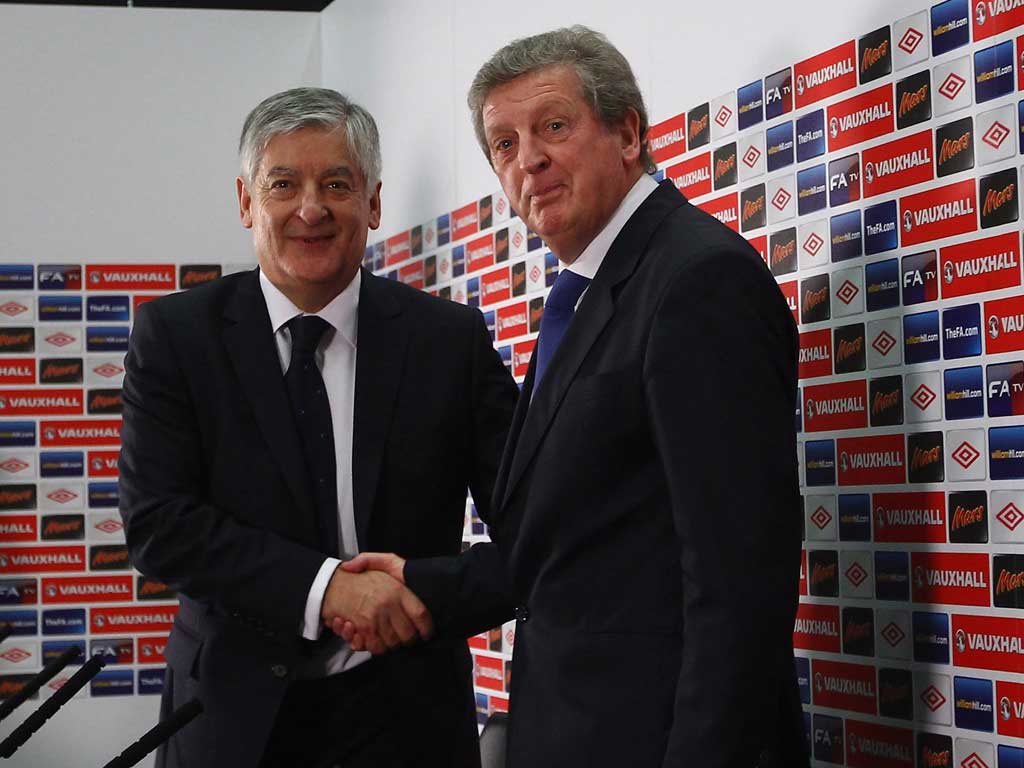The Last Word: Hodgson the right man for the wrong job
New England manager is more of technical coach while Redknapp would have inspired the players

It was an admirable idea of the Football Association's to employ Roy Hodgson last week. Unfortunately, they may have chosen the wrong job.
The governing body are about to appoint a technical director, a hugely important position for any national federation serious about their football, yet one the FA have too often fudged or merely flirted with. At times the England manager either doubled up or shared the responsibilities; for years it was filled by either Charles "Position Of Maximum Opportunity" Hughes or Howard Wilkinson, coaches far keener on direct play than the manager of the time.
Since Wilkinson left for Sunderland in 2002, it has not been filled on a permanent basis at all, although for the past eight years Sir Trevor Brooking, educated in a very different school at West Ham under Ron Greenwood, has been Director of Football Development. Now the new man will report to him.
Hodgson has worked in seven countries, been on countless technical study groups, is interested in the development of young players and coaches and has a view of life beyond the touchline. With the belated advent of the National Football Centre at Burton, he is a perfect fit. He has also been a coach for 35 years with considerable success, leading many to applaud his appointment as Fabio Capello's successor.
Yet the England team does not need a coach; it needs a manager and motivator. There is a subtle difference, which is underestimated in debate about the respective merits of the two most obvious English candidates for the position that has ground down so many good men.
The philosophies of Hodgson and Harry Redknapp are entirely different. Hodgson rightly regards himself as a coach above all, which is his official title at West Bromwich Albion, a club employing a sporting director in the highly regarded Dan Ashworth. An insight into the new England manager's day-to-day methods was provided in these pages two years ago, when Fulham's Simon Davies revealed: "Every day is team shape. He gets the 11 he wants on a match day and he drills in everything that he wants. It's certain drills defensive, certain drills attacking and we work very hard at it."
Redknapp, in contrast, believes in assembling the best players and letting them play. He does not "drill" Luka Modric or Rafael van der Vaart or Gareth Bale, but is shrewd enough to have wanted them in his team, and to know that the trio require a Scott Parker or a Tom Huddlestone to win the ball for them.
The enticing combination of results and entertainment achieved at Tottenham since he took over a side at the bottom of the Premier League prompted bookmakers, with much (though not unanimous) media support, to favour his cause.
A personal opinion is that his liberating approach would have been better suited, as well as simply more enjoyable for players and spectators, than the more autocratic Hodgson's drills with England squad members such as Wayne Rooney, Steven Gerrard, Jack Wilshere, Ashley Cole and the rest, who have all been taught by some of the country's best coaches for many years. Teaching is no longer what is required.
According to their most recent England mentor, who presumably left a debrief or two to the same effect in the Wembley offices before agreeing to resign, one of the squad's essential problems was too frequently "playing with fear", and Redknapp could have ameliorated that.
But the FA's gang of four overlooked him, Brooking taking the opportunity to deny that any personal animosity on his part was behind the choice. "We discussed a lot of candidates, none of whom I had a personal problem with," he said. "That didn't come into the decision-making at all."
At the same media briefing for Sunday newspapers, Hodgson admitted this would be the biggest challenge of his long career "without a shadow of a doubt" and that with a fortnight to put together his best squad, the timescale was hardly ideal.
Neither the FA nor Albion have made the immediate task any easier. The reason for not approaching his club once the decision was made "about a month ago" was that they believed Albion would have refused him permission to talk. That would have been almost unprecedented, even if Newcastle selfishly prevented Bobby Robson from returning after Kevin Keegan resigned in 2000.
At the start of April Albion were already eight points clear of relegation and by the middle of the month that margin had expanded to 13 points. Denied the possibility of taking a position at the pinnacle of his profession, Hodgson could either have demanded the right to do so at the end of the season – which would at least have given him more time to think about a European Championship squad – or resigned and begun immediately. When the current compromise was reached, Albion should certainly have recognised the urgency of the situation and allowed him to leave at once – with gratitude for securing them a mid-table position this season that few had forecast.
If there is a positive to be taken now, it is that the lack of expectation which even Brooking is fostering will remove some of the pressure from manager and players alike ahead of this summer's tournament.
Meanwhile the new man could do worse than pin the front-page headline from this paper's sports section on 11 March above his shaving mirror and repeat it 10 times before breakfast each day. "Hodgson: I don't think the England job is impossible."
Join our commenting forum
Join thought-provoking conversations, follow other Independent readers and see their replies
Comments